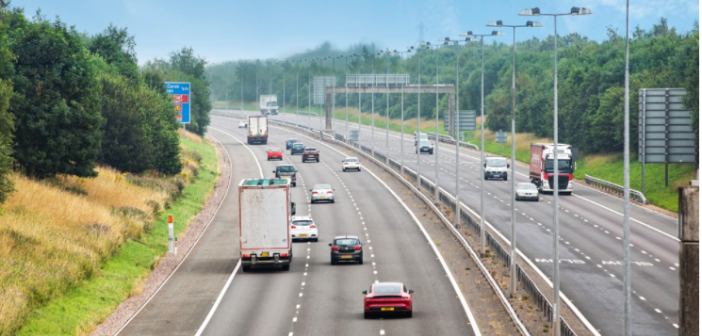Governments are often accused of failing to engage in the type of joined-up, long-term thinking which is necessary to come up with bold solutions for some of our most pressing policy challenges. The future of the UK road network risks being an example of this unless decisive action is taken to address the roads trilemma, writes Andrew Cliffe, CEO at M6toll…
Late last year, the government announced that the sale of petrol and diesel cars would end in the UK from 2030. This was an encouraging announcement – not just because of the impact that the transition to electric vehicles (EVs) will have on the environment, but because it also shows that government is willing to think strategically and boldly about the future of transport. These ambitions have been backed up by the government’s recently published Transport Decarbonisation Plan.
I hope that this trend for innovative thinking continues, particularly as it will be necessary to meet the long-term challenges posed by the ‘roads trilemma’. It is essential that government begins now to consider how the related, and seemingly conflicting, policy priorities of the trilemma can be holistically addressed to ensure the road network remains viable for the future.
What is the trilemma?
The ‘roads trilemma’ recognises there is a need to increase our road connectivity to drive economic growth and reduce congestion. However, we also need to decarbonise road transport to meet our climate change obligations and improve air quality. The transition to EVs means we’re on track to meet this last point, but the corresponding sharp decline in fuel duty revenues means there will be a significant shortfall at the Treasury – so where does the money come from to re-invest in the network?
It’s a real challenge for the government to address these priorities simultaneously but, as the 2030 date approaches, now is the time to examine innovative solutions while we still have time to act. It is also clear that this issue will not resolve itself. Department for Transport (DfT) data shows that traffic flows are now back to 90%-95% of pre-pandemic levels, with this rapid “bounce back” showing the resilience of traffic demand to external factors.
Plugging the funding gap
From the government’s perspective, a pressing aspect of the trilemma is the need to plug the looming funding gap. Currently, the Treasury receives over £30bn a year in funding from vehicles. That’s more than the total annual spend for the entire DfT. If EVs keep their zero Vehicle Excise Duty (VED) rating, combined with the drop in fuel duty revenues, there will be a significant fall in Government revenue come 2030.
A solution which is often mooted is to simply apply VED to EVs or to tax the electricity used to power them. The latter would require a fundamental shift in how our electricity network operates (another long-term challenge in itself!), while the former would remove some of the incentive of switching to an EV now. And there is no avoiding the fact that this transition remains absolutely necessary given the transport sector made up a quarter of all UK emissions in 2019.
Alternatively, the government could introduce VED over time to EVs in a similar manner to the fuel duty escalator in use in the 1990s. However, this is likely to be politically unpopular due to its ever-increasing nature and, crucially, it wouldn’t address the other key tenant of the trilemma: the need to increase connectivity and reduce congestion.
Driving economic growth
I know how important it is to ensure the road network continues to deliver in the best interests of drivers. Many of our main corridor routes are already congested and, indeed, one of the reasons why the M6toll was first opened in 2003 was to provide a free-flowing alternative to the M6.
It’s not as simple as just building more roads. For one, new routes will take many years to come to fruition so are not a viable short- or medium-term solution to the trilemma. And even if we did construct more roads for a mostly EV system, a separate solution would be required to resolve the funding gap.
Some suggest, erroneously in my view, that reducing our economic activity is another potential solution to tackle congestion. I would argue that this is akin to cutting off one’s nose to spite one’s face and is clearly a non-starter which would only lead to a whole host of additional challenges. We also cannot end up in a situation where we are actively discouraging road use as this would impact our economy and disproportionately hit the least well-off.
Resolving the trilemma
The roads trilemma is not going to be solved by the status quo. In fact, only the environmental impact is currently being addressed through the EV transition, but we must address all three aspects equally. A potential solution under consideration by some policymakers is that of road user pricing. If based on time or distance travelled, a road pricing scheme could resolve the funding gap, as well as address environmental concerns whilst driving economic growth.





